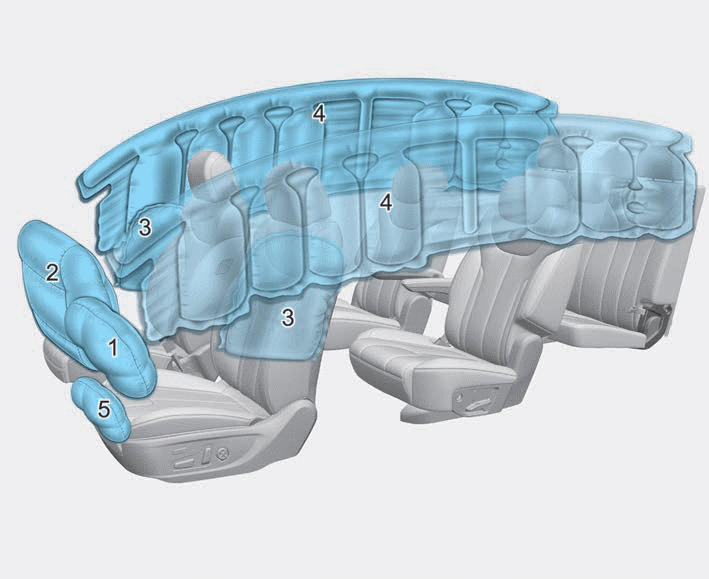Hyundai Palisade: Engine Control System / CVVT Oil Temperature Sensor (OTS)
Hyundai Palisade (LX2) 2020-2025 Service Manual / Engine Control/Fuel System / Engine Control System / CVVT Oil Temperature Sensor (OTS)
Description and operation
| Description |
Continuous Variable Valve Timing (CVVT) system advances or retards the valve
timing of the intake and exhaust valve in accordance with the ECM control signal
which is calculated by the engine speed and load.
By controlling CVVT, the valve overlap or underlap occurs, which in turn improves
fuel efficiency, reduces exhaust gases (NOx, HC) and improves engine performance
by reducing pumping loss, generating internal EGR effect, improving combustion
stability and volumetric efficiency, and increasing expansion work.
This system consists of the CVVT Oil Control Valve (OCV) which supplies the
engine oil to the cam phaser or cuts the engine oil from the cam phaser in accordance
with the ECM PWM (Pulse With Modulation) control signal, the CVVT Oil Temperature
Sensor (OTS) which measures the engine oil temperature, and the Cam Phaser which
varies the cam phase by using the hydraulic force of the engine oil.
The engine oil which is supplied through the CVVT oil control valve varies the
cam phase in the direction (Intake Advance/Exhaust Retard) or opposite direction
(Intake Retard/Exhaust Advance) of the engine rotation by rotating the rotor
connected with the camshaft inside the cam phaser.

Specifications
| Specification |
|
Temperature |
Resistance (kΩ) |
|
|
°C |
°F |
|
|
-40 |
-40 |
41.74 - 54.54 |
|
-20 |
-4 |
14.13 - 16.83 |
|
0 |
32 |
5.28 - 6.3 |
|
25 |
77 |
1.88 - 2.14 |
|
80 |
176 |
0.31 - 0.33 |
|
140 |
284 |
0.07 - 0.08 |
Schematic diagrams
| Circuit Diagram |

Harness Connector

Repair procedures
| Inspection |
| 1. |
Switch "OFF" the ignition.
|
| 2. |
Disconnect the OTS connector.
|
| 3. |
Remove the OTS.
|
| 4. |
After immersing the thermistor of the sensor into engine coolant, measure
resistance between the OTS terminals 1 and 2.
|
| 5. |
Check that the resistance is within the specification.
|
|||||||||||||||||||||||
| Removal |
| 1. |
Refer to Engine Mechanical System - "Oil Pressure Sensor"
|
| Installation |
| 1. |
Refer to Engine Mechanical System - "Oil Pressure Sensor"
|
 Rail Pressure Sensor (RPS)
Rail Pressure Sensor (RPS)
Description and operation
Description
Installed on the delivery pipe, the Rail Pressure Sensor (RPS) measures the
instantaneous fuel pressure in the delivery pipe...
 Oil Pressure Sensor (OPS)
Oil Pressure Sensor (OPS)
Description and operation
Description
Continuous Variable Valve Timing (CVVT) system advances or retards the valve
timing of the intake and exhaust valve in accordance with the ECM control signal
which is calculated by the engine speed and load...
Other information:
Hyundai Palisade (LX2) 2020-2025 Service Manual: Cowl Side Trim
Components and components location Component Location 1. Cowl side trim Repair procedures Replacement • When removing with a flat-tip screwdriver or remover, wrap protective tape around the tools to prevent damage to components...
Hyundai Palisade (LX2) 2020-2025 Service Manual: High Pressure Fuel Pump
Repair procedures Removal 1. Release the residual pressure in fuel line. (Refer to Fuel Delivery System - "Release Residual Pressure in Fuel Line") 2. Switch "OFF" the ignition and disconnect the negative (-) battery terminal...
Categories
- Manuals Home
- 1st Generation Palisade Owners Manual
- 1st Generation Palisade Service Manual
- Removing and Storing the Spare Tire
- Rear center seatbelt (3rd row)
- Power Outlet
- New on site
- Most important about car
Air Bag - Advanced Supplemental Restraint System

1. Driver's front air bag
2. Passenger's front air bag
3. Side air bag
4. Curtain air bag
5. Driver’s knee airbag
This vehicle is equipped with an Advanced Supplemental Air Bag System for the driver's seat and front passenger's seats.
Copyright © 2025 www.hpalisadelx.com
